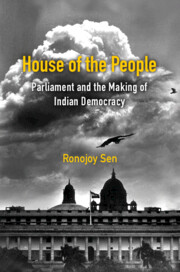Book contents
- Frontmatter
- Dedication
- Contents
- List of Illustrations
- Acknowledgements
- Introduction
- 1 The Road to Parliamentary Democracy: The Constituent Assembly and Its Prehistory
- 2 Protean Institution: The Changing Composition of Parliament
- 3 ‘Please Take Your Seat!’ Disruptions in Parliament
- 4 Inside Out: The Parliamentary Committee System
- 5 Corruption, Criminality and Immunity
- Conclusion
- Index
4 - Inside Out: The Parliamentary Committee System
Published online by Cambridge University Press: 11 October 2022
- Frontmatter
- Dedication
- Contents
- List of Illustrations
- Acknowledgements
- Introduction
- 1 The Road to Parliamentary Democracy: The Constituent Assembly and Its Prehistory
- 2 Protean Institution: The Changing Composition of Parliament
- 3 ‘Please Take Your Seat!’ Disruptions in Parliament
- 4 Inside Out: The Parliamentary Committee System
- 5 Corruption, Criminality and Immunity
- Conclusion
- Index
Summary
A big meeting never does anything.
– Walter Bagehot, The English ConstitutionThe committee isn't the least bit interested in the nature of truth. They’re all MPs!
– James Hacker, Yes MinisterDeep in the bowels of the Indian parliament building and its annexe are rooms that are used for parliamentary committee meetings. Much of the analysis of the Indian parliament is done on the basis of what happens on the floor of the House, which often seems dysfunctional and chaotic. Yet, away from the public eye, much of the important legislative work takes place in the committees. The committees are at the heart of parliament's efficiency and accessibility. The committee system, both its provenance and its functioning, also remains one of the least studied aspects of the Indian parliament. This chapter attempts to address this gap.
Walter Bagehot, editor of The Economist (1860–77) and author of The English Constitution, had commented on the importance of smaller meeting groups when he wrote in 1867 that while debates on the floor of the parliament provided for a ‘grand inquest’ of the nation, a ‘big meeting never does anything’.
This is perhaps true for most parliaments where grandstanding often dominates the floor of the House and committees have assumed increasing importance. As one study notes, ‘The growth of centrality of the committee stage has occurred not only in some parliaments, but appears to be a global phenomenon.’ This phenomenon though is a fairly recent one. Parliamentary committees have always been central to the United States Congress, with Woodrow Wilson noting in 1885, ‘Congress in its committee rooms is Congress at work.’ Indeed, Wilson called them ‘little legislatures’. In the twentieth century, the US congressional committee system expanded considerably, resulting in the establishment of several committees and sub-committees. As Longley and Davidson noted in the late 1990s:
US congressional committees continue very strong today, both in terms of initiating and managing legislation and in controlling the executive. They have created an important committee-centred bureaucracy on Capitol Hill … in an effort to cope with the growing complexity of the modern American polity and the enormous resources of the executive.
- Type
- Chapter
- Information
- House of the PeopleParliament and the Making of Indian Democracy, pp. 179 - 214Publisher: Cambridge University PressPrint publication year: 2023



